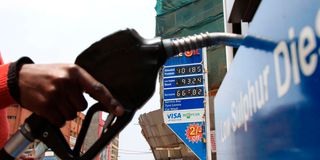More pain at the pump as fuel prices hit a historic high

An attendant at a Nyeri petrol station prepares to fill up a car in August 2020.
What you need to know:
- The Energy and Petroleum Regulatory Authority (Epra) on Sunday announced raising the retail fuel prices by Sh3.4 for Super Petrol, Sh6.4 for Diesel and Sh15.19 for Kerosene, for consumers in Nairobi.
- The new prices are inclusive of 8 per cent Value Added Tax (VAT), which the Treasury, in the Finance Bill, 2023, proposes to double to 16 per cent, a move that if passed would see fuel prices go even higher.
Kenyans will pay between 2 per cent and 9.4 per cent more for fuel products in the month to June 14, in the newly announced retail fuel prices effective May 15.
The Energy and Petroleum Regulatory Authority (Epra) on Sunday announced raising the retail fuel prices by Sh3.4 for super petrol, Sh6.4 for diesel and Sh15.19 for kerosene, for consumers in Nairobi.
In the changes, kerosene consumers are most hit, where a litre in Nairobi now costing Sh161.13 from Sh145.94, a 9.4 per cent increase.
Diesel, which will now retail at Sh168.4 in Nairobi, has recorded a 3.9 per cent price increase from the Sh162 it retailed at in Nairobi between April 15 and May 14, with Epra indicating that the subsidy for the two products was eliminated, occasioning the increase in prices.
“The subsidy on diesel and kerosene has been removed,” Epra stated in a press statement on Sunday.
A litre of super petrol will now retail at Sh182.7 in Nairobi, up from Sh179.30, after the price was adjusted upwards by 1.9 per cent.
In Kisumu, a litre of super petrol will retail at Sh182.53, diesel at Sh168.6 and kerosene at Sh161.35. In Nakuru, super petrol will sell at Sh181.83 from Sh178.62, diesel at Sh167.91 (a 3.76 per cent increase) and kerosene at Sh160.65, from Sh145.79.
In Eldoret, super petrol will retail at 1.69 per cent higher at Sh182.54 per litre, diesel at Sh168.61 from Sh162.72 and kerosene at Sh161.35 (10 per cent higher).
“The average landed cost of imported super petrol increased by 8.63 per cent from US$666.51 per cubic metre in March 2023 to US$724.01 per cubic metre in April 2023. Diesel decreased by 2.51 per cent from US$705.82 per cubic metre to US$688.07 per cubic metre while kerosene decreased by 1.13 per cent from US$707.53 per cubic metre to US$699.54 per cubic metre,” Epra stated.
In April, the regulator maintained prices set in March, when the price of super petrol was increased by Sh2, while those of diesel and kerosene was not adjusted.
Epra in April said the price of diesel was cross subsidised with that of super petrol while a subsidy of Sh17.12 per litre was maintained for kerosene.
The new prices are inclusive of 8 per cent Value Added Tax (VAT), which the Treasury, in the Finance Bill, 2023, proposes to double to 16 per cent, a move that if passed would see fuel prices go even higher.
It is also the first time Kenyans will be consuming fuel under the government-to-government fuel importation initiative between Kenya and the United Arabs Emirates (UAE), brought about two months ago to alleviate a dollar crisis.
It allows oil marketers to purchase fuel products in local currency, while importers are given a six-month credit period before paying suppliers in dollars.
Energy Cabinet Secretary Davis Chirchir, however, indicated that under the programme, any local currency depreciation costs occurring between the time of supply and payment of suppliers will be recovered from consumers at the pump.
“As a government, we are willing, through Epra, to manage and recover the depreciation at the pump. That is what the LOS (Letter of Support) does, which is what we do in the energy and power sectors. We take the dollar valuation forex loss to the customer,” Mr Chirchir said last month.




